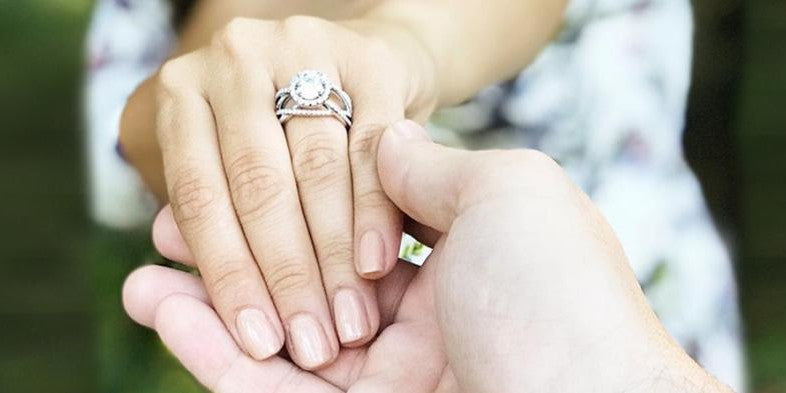Buying a diamond can be stressful. We get it: you don’t want to make an expensive mistake! But our customers tell us it’s not really the money: it’s the symbol of your love that you’ll have forever. That’s why it has to be just right. Here’s what we’ve learned are the most common diamond buying mistakes and how you can avoid them and pick the right diamond for you and the one you love.
1. Set A Budget (& Stick to It)
This one should be easy but we see customers struggle with it all the time. In a survey of 13,000 couples by The Knot, one-third of couples spent more than they wanted to on the diamond. It’s OK to adjust your budget if needed to buy the ring of your dreams but once you do the work to figure out how much you can afford, stick to it. To figure out the best possible diamond you can buy for your budget, ask ROSI, the diamond-picking artificial intelligence algorithm powered by IBM Watson. ROSI won’t try to upsell you or convince you to spend more. You’ll just see the best that your money can buy and you can make a decision from there.
2. Don't Forget the Setting
Remember: you are buying a ring, not just a rock. The setting is as important as the center stone. Make sure you price the setting style you want before you spend your entire budget on a diamond. A simple high-quality 14k solitaire setting starts at less than $500 but a setting with more diamonds could be more than $5,000. Interested in something specific? Commissioning a custom design is a lot easier then you might expect. At Rockher, we make it easy to design custom rings. We charge you a set design fee and give you a guaranteed price for labor and materials: there are no hidden markups to worry about.
3. Don't Stress About the Surprise
Because you spend so much time getting into the details of diamonds and quality, it’s easy to lose sight of what really matters: showing someone how much you care. If she’s low-key, a big rock may not really be right for her. If she’s got her heart set on a cushion cut, the most impressive round diamond might be a bit disappointing. If you really don’t know what she wants, consider shopping together: you can still surprise her with the proposal.
4. Don't Get Stuck on Exact Grades
We see this all the time: a customer does research and decides that an H VS1 is the right diamond and won’t budge on that grade, even when it means sacrificing on cut or size or the setting. When the diamond is in a ring, who will know that it’s VS1 and not VS2? Instead of sticking to one specific grade, take your budget and find the best possible diamond, weighing all the factors together, Honestly, cut is what makes a diamond beautiful: it’s the one thing you should never sacrifice.
5. All Diamond Reports Aren't the Same
What’s the quality grade of your diamond? If you are going on the word of the seller or a report by a for-profit laboratory, you are making a mistake. The only diamond grading reports you can trust are from not-for-profit institutions: the Gemological Institute of America and the American Gem Society. Period. Other labs may sound like they are “institutes” but because they are in it for profit, there is too much pressure to please dealers and retailers. Their grades are often inflated to make you think you are getting a good deal (and make the retailer look good). Industry professionals discount all reports other than GIA and AGS and you should too.
6. Don't Buy Without Putting Your Choice to the Test
Once you’ve found the diamond that you think is the one, don’t buy it until you put it to one final test. Take the A.I. Challenge: compare your diamond by putting the GIA report number into ROSI, the diamond-picking algorithm powered by IBM’s Watson and see if artificial intelligence can find you a better value. You may find a higher-rated diamond at the same price or a similar stone for a lower price. More than a third of grooms in the survey by The Knot said they weren’t sure they got a good deal. Why pay more than you have to for a diamond that isn’t as good? That would be a (completely avoidable) mistake. If your diamond passes the A.I. Challenge, you know you are really getting a great deal.
